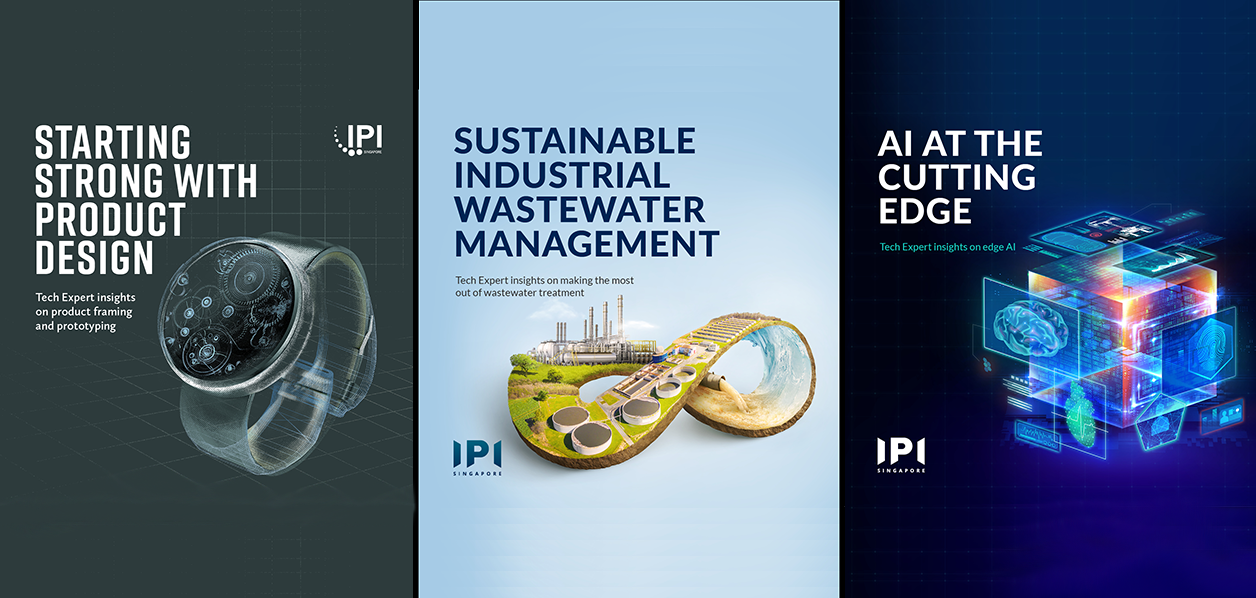Engaging IPI’s Tech Experts to realign your business focus
From wastewater treatment to artificial intelligence, IPI’s Tech Experts offer insights that will strengthen businesses in pursuit of innovation. Download our white papers to find out more.
Building a business from the ground up is challenging—from crafting a business plan, carving a space for yourself and your product in the right market to the nitty-gritty work of daily operations. With so much passion pumped into starting and running a company, it can sometimes be hard for entrepreneurs to pinpoint their blind spots.
To offer an objective perspective based on hard-earned expertise, it is not uncommon for external consultants to be called in to turn the tide and improve a company’s processes, whether in times of crisis or even growth. In fact, despite the global pandemic, the Asia Pacific consulting sector grew to about US$25 billion in 2020—making up one sixth of the global industry.
From successful international giants like Shell to SMEs yet to go to market, many companies across a multitude of industries have benefitted from seeking the help of external consulting companies and experts. In our Starting Strong With Product Design, Sustainable Industrial Wastewater Management and AI At The Cutting Edge white papers, three IPI Tech Experts share their insights on the biggest issues within their respective industries, as well as examples of how they have personally helped solve major challenges in those fields.
Framing the problem
With so much invested in a business, both financially and emotionally, many want to get ahead quick. Businesses passionate about their products understandably want to speed up the process and go straight to prototyping, production and sales, but doing so often means glossing over product framing.
However, in the Starting Strong With Product Design white paper, Jeremy Sun of Orcadesign Consultants explains the importance of taking the first step in a deliberate and thoughtful way. Despite the temptation to immediately focus on the features or technology of a product, it pays to take the time to understand what matters most to the target demographic first, Sun said. In his experience guiding companies, Sun has seen first-hand the benefits of robust product framing.
As detailed in the white paper, Sun recalls a product that was intended to reduce the workload of healthcare personnel. However, after speaking to healthcare professionals, the team discovered that the original product would disrupt their schedules rather than free up time. Discovering this major flaw early allowed the team to reframe and redesign a product that would truly benefit their consumers.
“Companies are being disrupted not because they are incompetent, but because they are out of touch with what consumers want,” Sun added. By working with experts like Sun, companies can obtain valuable customer insights that will guide their product design decisions.
Academic rigour and real-world know-how
Putting customers first is crucial to understanding the problem, but solving the problem then requires a deep understanding of what solutions are practical and what technologies are on the horizon. Combining both in the field of wastewater management is Professor Ng Wun Jern, a wastewater treatment expert from Nanyang Technological University, Singapore, with over 30 years of experience in environmental engineering.
In the Sustainable Industrial Wastewater Management white paper, Prof Ng shared how his research and industrial experience came into play with a case study of a pig farm seeking to treat the wastewater it produced. Prof Ng suggested two solutions—a sludge blanket and membrane bioreactor, both of which will increase microbial population by placing a concentrated layer of microbes at the base of the reactor and a membrane to stop them from flowing out, respectively.
Drawing from his experience and extensive research, Prof Ng helped to reduce plant failure and solve problems quickly, while generating valuable resources to reduce the cost or increase productivity for other business operations. Prof Ng’s breadth and depth of knowledge on the topic saved both time and money for the companies he has assisted.
Addressing the talent crunch
When it comes to emerging industries, however, it can be difficult to find people with the right expertise, particularly when it comes to the intersection of different fields. While it is already challenging to hire people with skills in artificial intelligence (AI), given the strong demand, it is even harder to find AI talent that is also adept in the field of Internet of Things (IoT) devices.
Yet these are the demands of edge AI, a promising field where AI models are compressed to fit smaller, memory-constrained IoT devices and require very specific expertise to manage. “Edge AI projects of this kind will need very close collaboration between embedded systems engineers and machine learning engineers to shorten the otherwise lengthy product development cycles,” said Liang Kin Onn, a deputy manager at the Centre of Innovation for Electronics and IoT (COI-EIoT) who was profiled for the AI At The Cutting Edge white paper.
With edge AI poised to benefit a variety of businesses from the medical to the manufacturing industry, expert advice will prove invaluable when navigating the unchartered territory of this emerging field.
For businesses looking to solve an existing technical challenge or embark on a new innovation opportunity, IPI Tech Experts are here to help. Download our white papers here to find out more.

